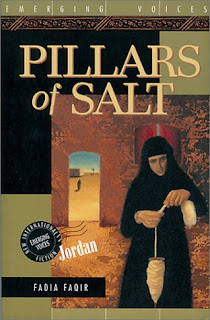Summerbook #14: Pillars of Salt
I was saving this novel for August's Women in Translation event, and got halfway through before I looked at the copyright information and realized that Faqir, a Jordanian author, actually wrote this story in English. So, oops. Good thing I've got a Spanish mystery so I won't totally miss out on WIT!
Two women are imprisoned in a mental asylum, and tell each other their stories. Maha's life is told in the first person, in flashbacks. Um Saad narrates her life to Maha each evening when the lights go out, since they aren't supposed to talk. And a storyteller jumps in every so often to tell Maha's life through his own malicious and gossipy lens.
Maha lives on a small farm with her father and no-good brother. She is delighted to marry her husband, the Bedouin Harb, and they are deeply in love, but he spends most of the time off in the mountains, raiding English camps. Despite this, the village is talking about Maha's barrenness only six months into the marriage (!). When Harb is killed in an English attack, Maha is devastated, but comforted by finding that she is pregnant. She has a son, and goes home to care for her father and the land, but her brother often makes her life miserable.
Um Saad, a middle-class city girl, was in love with a nice young man, but their attraction offends her father and he marries her off to a much older man, a butcher. Her life is an unending round of cleaning, cooking, and bearing the eight sons whom she loves, but then her husband brings home a new young wife. She is relegated to sleeping on the kitchen floor, and still expected to do all the chores.
Both women object to how they are treated, and both are sent off to the asylum by the men who find them bothersome -- and there, men still find them bothersome and try to stop them from telling their stories to each other. Meanwhile, the storyteller accuses Maha of witchcraft, and makes her out to be a malicious half-demon.
Maha's story is very immediate; we are right there with her and feel what she feels. Um Saad, on the other hand, feels a little bit removed. We aren't in her head, but we're in the asylum and hearing her tell her life story.
This is not an anti-male novel; there are more good men in it than bad, and no shortage of malicious women in the village. Rather, the cultural structure they all live in grants enormous power to men and practically none to women, and the result is that just a couple of self-centered men can cause a lot of damage to everyone.
It's a beautifully-written and structured novel, and I thought it was very good indeed.





Comments
Post a Comment
I'd love to know what you think, so please comment!